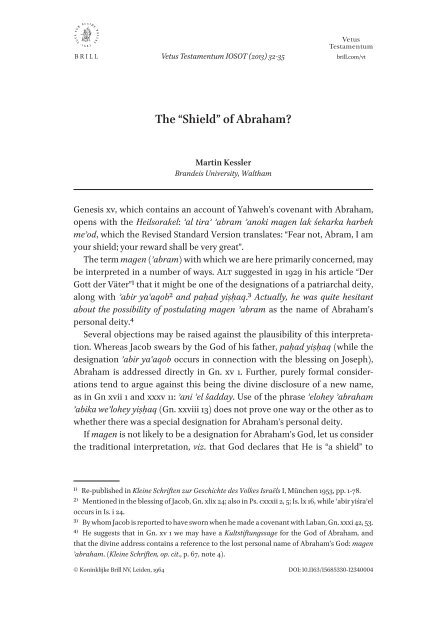Special Issue IOSOT 2013 - Books and Journals
Special Issue IOSOT 2013 - Books and Journals
Special Issue IOSOT 2013 - Books and Journals
Create successful ePaper yourself
Turn your PDF publications into a flip-book with our unique Google optimized e-Paper software.
Vetus Testamentum <strong>IOSOT</strong> (<strong>2013</strong>) 32-35<br />
Vetus<br />
Testamentum<br />
brill.com/vt<br />
The “Shield” of Abraham?<br />
Martin Kessler<br />
Br<strong>and</strong>eis University, Waltham<br />
Genesis xv, which contains an account of Yahweh’s covenant with Abraham,<br />
opens with the Heilsorakel: ʾal tiraʾ ʾabram ʾanoki magen lak śekarka harbeh<br />
meʾod, which the Revised St<strong>and</strong>ard Version translates: “Fear not, Abram, I am<br />
your shield; your reward shall be very great”.<br />
The term magen (ʾabram) with which we are here primarily concerned, may<br />
be interpreted in a number of ways. Alt suggested in 1929 in his article “Der<br />
Gott der Väter”1 that it might be one of the designations of a patriarchal deity,<br />
along with ʾabir yaʿaqob2 <strong>and</strong> paḥad yiṣḥaq.3 Actually, he was quite hesitant<br />
about the possibility of postulating magen ʾabram as the name of Abraham’s<br />
personal deity.4<br />
Several objections may be raised against the plausibility of this interpretation.<br />
Whereas Jacob swears by the God of his father, paḥad yiṣḥaq (while the<br />
designation ʾabir yaʿaqob occurs in connection with the blessing on Joseph),<br />
Abraham is addressed directly in Gn. xv 1. Further, purely formal considerations<br />
tend to argue against this being the divine disclosure of a new name,<br />
as in Gn xvii 1 <strong>and</strong> xxxv 11: ʾani ʾel šadday. Use of the phrase ʾelohey ʾabraham<br />
ʾabika weʾlohey yiṣḥaq (Gn. xxviii 13) does not prove one way or the other as to<br />
whether there was a special designation for Abraham’s personal deity.<br />
If magen is not likely to be a designation for Abraham’s God, let us consider<br />
the traditional interpretation, viz. that God declares that He is “a shield” to<br />
1) Re-published in Kleine Schriften zur Geschichte des Volkes Israëls I, München 1953, pp. 1-78.<br />
2) Mentioned in the blessing of Jacob, Gn. xlix 24; also in Ps. cxxxii 2, 5; Is. lx 16, while ʾabir yiśraʾel<br />
occurs in Is. i 24.<br />
3) By whom Jacob is reported to have sworn when he made a covenant with Laban, Gn. xxxi 42, 53.<br />
4) He suggests that in Gn. xv 1 we may have a Kultstiftungssage for the God of Abraham, <strong>and</strong><br />
that the divine address contains a reference to the lost personal name of Abraham’s God: magen<br />
ʾabraham. (Kleine Schriften, op. cit., p. 67, note 4).<br />
© Koninklijke Brill NV, Leiden, 1964 DOI: 10.1163/15685330-12340004








![Am HaSefer [Volk des Buches] - Books and Journals](https://img.yumpu.com/20648352/1/174x260/am-hasefer-volk-des-buches-books-and-journals.jpg?quality=85)







